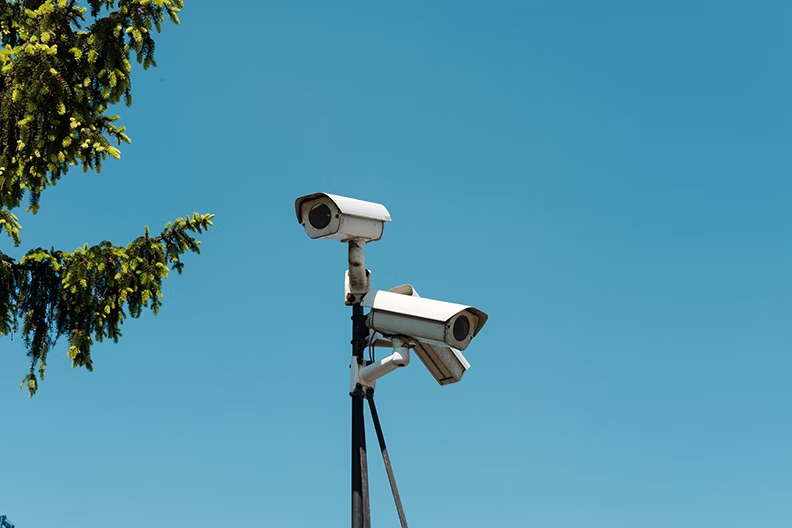Although CCTV systems are being adopted in UK regions, privacy issues still exist. Should the camera of your neighbor be focused on your house, you may get uncomfortable or molested. Questions about your rights, monitoring legality, and actions surface quickly. UK legislation strikes a mix between property rights and privacy. Knowing the legal surveillance boundaries can help you to relax about cameras in your surroundings. This page covers the laws, your rights, and how to protect your privacy should you feel watched.
Is It Legal for Neighbors to Record You with CCTV?
Understanding Public vs. Private Space Laws
UK laws govern surveillance differently in public and private contexts. A camera capturing just the owner’s private property usually does not violate privacy laws. Legal obligations arise when it occupies shared or adjoining places. Gardens, windows, and driveways are safe from snooping. Recording in these areas without cause may infringe on privacy. Even in public, filming must be appropriate and lawful. The law may require your neighbor to limit or justify their camera’s intrusion into your house.
Local and National Privacy Regulations That Apply
The UK GDPR and Data Protection Act 2018 governs the acquisition and storage of personal information, including CCTV footage. If your neighbor’s camera films are outside their bounds, they become a “data controller” and are required to follow the rules. This includes publishing notices, limiting data, and safeguarding storage. The ICO enforces these restrictions. Filming your garden without permission may result in a legal case. These guidelines protect you from intrusive spying while allowing reasonable home security.
When Surveillance Becomes Harassment
Persistent, targeted surveillance that causes distress is considered harassment. If a neighbor’s camera is regularly filming your private places, particularly bedrooms or remote gardens, this may constitute stalking or harassment under UK law. Repeated behaviors that intrude on your privacy and make you feel watched might be reported to local authorities as antisocial behavior. Even if the camera was put in for security reasons, it should not be used to threaten or intrude. If you believe you have been harassed, you may be entitled to seek legal action under harassment statutes or request that the council examine the situation.
What Actions Can You Take If You Feel Watched?
Start by Talking to Your Neighbor
CCTV conflicts are typically addressed swiftly by open conversation. Express your concerns politely to your neighbor. They may not realize their camera is recording your property. Request repositioning or privacy masking. A polite conversation can result in swift improvements that do not require legal action. It aids in dispute resolution and emotional stability. You may even show them what the webcam sees inside your house. Informal settlement can maintain good neighborly relationships and handle disputes faster than external authority. Never escalate without first attempting this.
How to File a Complaint with Authorities
Should your neighbor refuse, compile evidence and report it to the ICO. Photographs, dates, and attempted communications can help you to document how CCTV has affected your property. Use the ICO’s online “Raise a concern” form to formally file a complaint. They will ascertain infractions of data security. Should your allegation be legitimate, the ICO can contact the neighbor, ask for corrections, or send enforcement warnings. One should communicate professionally and respectfully. Legal infractions fit this period the best, not misunderstandings. There is no attorney needed with this choice.
Legal Remedies and Small Claims Court Options
Should grievances and communication fail, give legal action some thought. Civil claims, including “nuisance” or privacy violations, can be heard by small claims courts. Send a formal letter outlining the problem and fix it. Should it be ignored, you might claim for damages or an injunction. You have to show that your neighbor’s camera violates your right to privacy. Courts might order redirection or camera removal. For small instances, reasonably priced legal expenses are available. Should none of the previous options work, this is the last resort.
How to Protect Your Privacy from Neighbor’s Security Cameras?
Use Visual Obstructions to Block the View
Simple adjustments to your outside space can prevent a neighbor’s CCTV from recording your home. Consider using fences, screens, or thick hedges to conceal the camera’s view. Curtains or window coatings can block indoor recording without reducing natural light. Pergolas and gazebos are examples of outdoor buildings that provide shade while also improving your yard. Ensure that any changes comply with local planning regulations. Visual boundaries are frequently sufficient to reclaim your privacy without conflict. Even little impediments might distort the line of sight. If you’re wondering, “Can my neighbor have CCTV pointing at my house in the UK?” then blocking the view is a proactive protection.
Install Counter-Surveillance or Privacy Tech
Modern technology has methods for protecting privacy. Anti-glare technology, privacy window coverings, and motion-activated lights can all reduce camera performance. Some homeowners install phony cameras or mirrors to deter spying but exercise caution to prevent escalation. Indoor smart technology includes motorized blinds and light-dimming glass. Before employing complex solutions such as privacy filters or CCTV jammers, make sure to check your local regulations. The goal is to protect your region without infringing on the rights of your neighbors. Responsible technology usage can help to reduce unwanted surveillance.
Keep Records and Evidence of Surveillance Issues
If your neighbor’s camera is causing persistent issues, keep thorough notes. Log the dates and times you observe filming, take photographs or films of the camera’s perspective, and save copies of any communications. This paperwork backs up your claim if you escalate the problem. It is also beneficial if you involve authorities or take legal action afterward. A clear record demonstrates the scope of the incursion and your efforts to settle it amicably. Consistent evidence strengthens the argument and proves that your worries are justified. Well-organized paperwork is essential for preserving your rights, whether before the ICO or in court.
Conclusion
Being monitored by a neighbor’s CCTV might be quite frightening. Fortunately, UK law allows you to contest monitoring that violates your privacy. While your neighbor has the right to safeguard their house, this should not include continual monitoring of your property. Always start with a conversation—it’s frequently enough to address the problem. However, if that fails, regulatory and legal options exist. Now that you know the answer to “can my neighbour have cctv pointing at my house uk?“, you’re empowered to act. With the right knowledge and approach, you can reclaim your privacy and maintain peace in your neighborhood.


